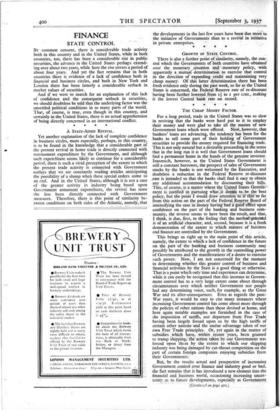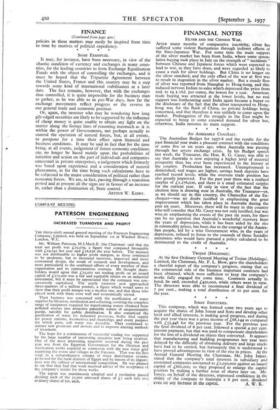THE CHEAP MONEY FACTOR.
For a long period, trade in the United States was so slow in reviving that the banks were hard put to it to employ their money and were glad to take all the masses of new Government loans which were offered. Now, however, that bankers' loans are advancing, the tendency has been for the banks to sell some part of their holding of Government securities to provide the -money required for financing trade. This is not only natural but a desirable proceeding in the sense that in the long run it is well that Government loans should find a permanent home in the hands of the genuine investor. Inasmuch, however, as the United States Government is still a constant borrower, the prospect of sales of Government stocks by the banks is not welcomed by the Executive, and doubtless a reduction in the Federal Reserve re-discount .rate is intended so that the banks shall find it easy to obtain any additional accommodation by discounting their bills. This, of course, is a matter where the United States Govern- ment is justified in pursuing what 'it deems to be the best policy, but the point I would draw attention to is that to far from this action on the part of the Federal Reserve Board of intensifying the ease in money having had a good 'effect upon confidence on the part of the banking and business com- munity, the reverse seems to have been the result, and that, I think, is due, first, to the feeling that the method IMrsnitd is of an artificial character, and, second, because it is a, fresh demonstration of the extent to which matters of business and finance are controlled by the Government.
This brings us right up to the main point of this article, namely, the extent to which a lack of confidence in the future on the part of the banking and business community may possibly be attributed to the growth in the controlling power of Governments and the manifestations of a desire to exercise such power. Now, I am not concerned for the moment in determining whether this greater control of business and financial activities by the State is a good thing or otherwise. That is a point which only time and experience can determine, while it can easily be recognised that this increase in Govern- ment control has to a very large extent come about through circumstances over which neither Government nor people had any determining voice, such, for example, as the Great War and its after-consequences. Even as regards the post- War years, it would be easy to cite many instances where increasing Government control has come about more through the policies of other nations than those devised at home, and here again notable examples are furnished in the case of the imposition of tariffs, our departure from Free Trade having been largely forced upon us by the high tariffs of certain other nations and the undue advantage taken of our own Free Trade principles. Or, yet again in the matter of subsidies which have, within recent years, been granted to tramp shipping, the action taken by our Government was forced upon thcm by the extent to which our shipping industry was being damaged by cut-throat competition on the part of certain foreign companies enjoying subsidies from their Governments.
But, be the results actual and prospective of increasing Government control over finance and industry good or bad, the fact remains that it has introduced a new element into the financial and business world, occasioning increasing uncer- tainty as to future developments, especially as Government (Contin:fed on page 402.)
FINANCE
(Continued from page 400.) policies in these matters may easily be inspired from time to time by motives of political expediency. * * * *











































 Previous page
Previous page